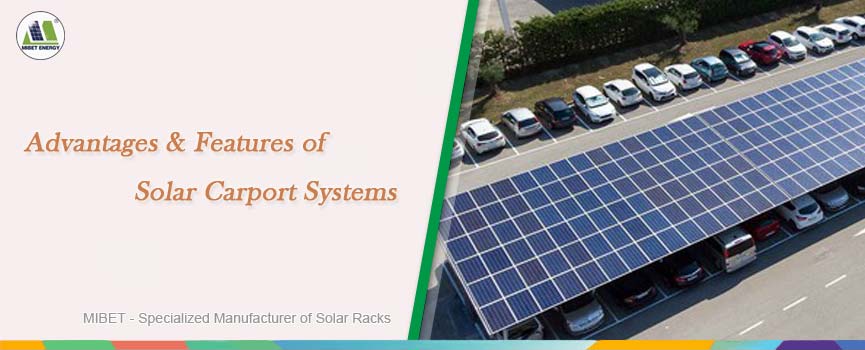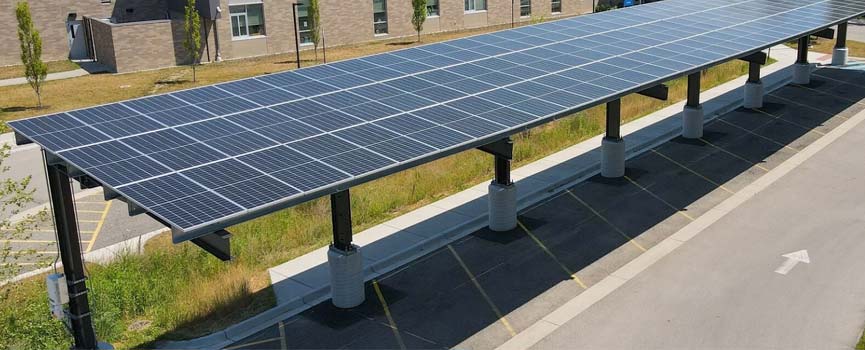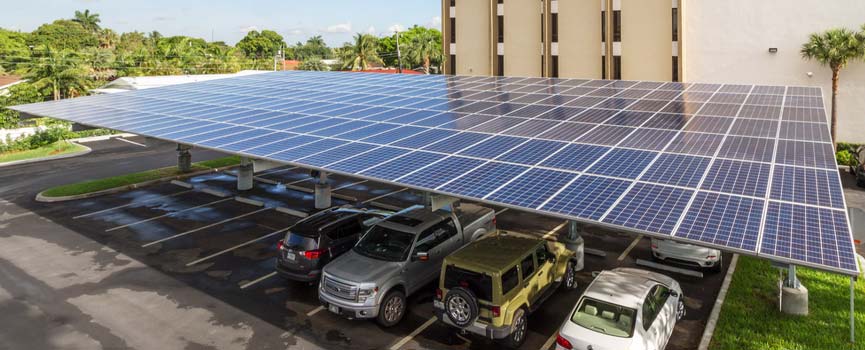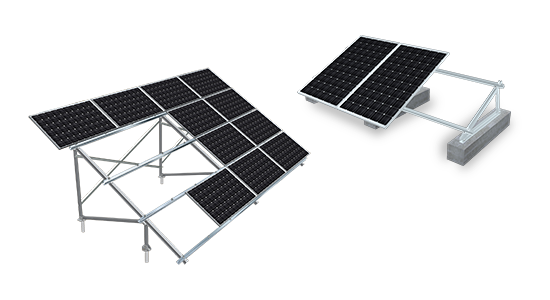Advantages & Features of Solar Carport Systems

A solar carport is, like a canopy installed above parking spaces to capture power. It makes use of spaces and offers a green way to produce electricity. Unlike carports or patio covers that just give shade solar carports turn unused areas into eco friendly energy sources.
If you're interested in being more eco conscious and reducing your dependence on fossil fuels a solar carport could be a choice, for you. This piece will explain what a solar panel carport system is, how it works and the advantages and disadvantages of having one installed.
What is a Solar Carport?
Solar carports are structures that combine covered parking with solar panels, creating a space-efficient solution for generating clean energy. By utilizing existing parking areas, solar carports offer a practical approach to renewable energy integration without requiring additional land.
The growing demand for EVs has further propelled the adoption of solar carports. Integrating EV chargers with solar canopies allows for convenient and sustainable charging, utilizing renewable energy to power vehicles. This combination is expected to become increasingly prevalent in parking lots, contributing to a greener transportation infrastructure.
Installing a solar carport provides several benefits to owners. It allows for on-site power generation in a readily available space, which can be used to offset energy costs for existing operations or generate additional income by selling excess power back to the grid. Additionally, solar carports offer protection from the elements for parked vehicles, a feature particularly attractive to car dealerships and businesses with customer parking.
The functionality of solar carports is similar to ground-mounted PV systems, with both utilizing racking structures anchored directly into the ground. However, solar carports require taller structures to accommodate parked vehicles, ensuring adequate clearance and accessibility.
Solar Carports for Every Application
Mibet provides tailor-made solar carport mounting solutions to fit the needs of any parking lot, offering both single and double-row configurations.
Our carports are constructed from aluminum, ensuring excellent resistance to corrosion. The primary anchoring method utilizes foundation bolts embedded in concrete blocks, further reinforced with poured concrete. This straightforward design aesthetic seamlessly integrates into various settings, including shopping malls, corporate campuses, hospitals, government facilities, and parks.
Beyond providing shade for vehicles, our solar carports generate clean energy, offering a profitable and sustainable solution. We specialize in designing and optimizing carports for parking lots and driveways, ensuring each project receives a customized solution that maximizes efficiency and aesthetics.
By employing high-strength, lightweight aluminum alloy and steel, combined with professional industrial design principles, we create solar carports that are not only structurally sound but also visually appealing. The resulting structures are simple, elegant, and modern, seamlessly complementing their surroundings.
Our solar carport mounting systems are designed for convenient and straightforward installation, making them ideal for open spaces adjacent to residential or commercial buildings, such as shopping malls. These systems offer a cost-effective and streamlined approach to providing shaded parking while simultaneously generating renewable energy.
Advantages of a Solar Carport

Although carports may have a higher initial cost compared to rooftop solar systems of the same capacity, their advantages extend far beyond mere cost considerations.
1. Slashing Energy Costs
Installing a solar carport can significantly reduce or even eliminate your reliance on the grid and its associated expenses. The expansive surface area of carports allows for the installation of numerous solar panels, generating substantial clean energy for your property. With sufficient capacity, you might even produce surplus energy and sell it back to the grid through net metering programs, further diminishing your energy costs.
2. Maximizing Space
Conventional ground-mounted solar setups often occupy valuable land space, leaving the area beneath the panels unproductive unless combined with practices like agrovoltaics. Similarly, parking lots, while necessary, often represent underutilized space. Solar carports address this issue by transforming existing parking areas into energy-producing hubs, maximizing space utility.
3. Protecting Your Vehicle
Beyond environmental benefits, solar carports offer the practical advantage of safeguarding your vehicle from the elements. Whether it's scorching heat, heavy rain, or snowfall, a carport provides shelter for your car, minimizing weather-related damage. This is particularly beneficial in regions with harsh weather conditions.
4. Seamless EV Charging
For electric vehicle (EV) owners, solar carports present an opportunity to further embrace eco-friendly transportation practices. By utilizing the generated solar power directly to charge your EV, you can reduce your dependence on traditional fuels and lower your environmental impact. The close proximity of the panels to your vehicle simplifies the charging process.
5. Enhanced Solar Power Generation
When rooftop solar installations are limited by space or shading, carports offer a viable alternative despite the higher initial cost. Installers can flexibly position the carport for optimal sun exposure, enhancing energy production, reducing carbon emissions, and ultimately leading to significant savings on monthly electricity bills.
Disadvantages of a Solar Carport
When considering a carport it's crucial to weigh the pros and cons. Here are three important factors to consider:
1. Initial Investment Increase
Unlike rooftop solar installations, which typically require relatively inexpensive mounting systems, solar carports necessitate a robust standalone structure. This means an upfront cost, starting from thousands of dollars and potentially going up to tens of thousands for larger commercial projects.
2. Space Requirements
Do you have outdoor space for a solar carport? An average household typically needs 400 to 700 feet of solar panels for complete energy self sufficiency. If space is limited a smaller carport can still help lower your energy costs though it might not eliminate them entirely.
3. Permitting Challenges
Obtaining permits for a carport can be complex due to the need to comply with regulations for parking structures and energy facilities. The specific rules vary based on your government and zoning policies. Moreover engineering certifications are often necessary, for commercial carports.
Incentives For Solar Carport Installations

Investing in a solar carport can be financially attractive for both homeowners and businesses. Let's take a look at the various incentives and cost-saving opportunities:
For Homeowners
● Federal Solar Tax Credit: You might qualify for a federal tax credit that cuts the cost of your home solar carport by 30% leading to significant savings of up to approximately $6,000 for a 5kW system.
● State and Local Incentives: Many states and local governments offer extra incentives like rebates and tax credits to promote the use of solar energy. Checking out these programs in your area could lower your costs more.
● Utility incentives: Some utility companies give rewards for setting up carports. Get in touch with your utility provider to learn about any available initiatives.
For Businesses
● Investment Tax Credit: Commercial solar carport setups may be eligible for a 30% investment tax credit, which can greatly reduce the project expenses.
● Bonus Depreciation: Businesses can gain from quicker deductions on their solar carport investment through accelerated depreciation.
● SREC Markets: Certain states have markets for Solar Renewable Energy Certificates (SRECs) where you can sell the solar power produced by your carport, for added revenue.
Cost of a Solar Carport
When you're thinking about energy you have a few choices for installation such as putting panels on your roof or setting up solar carports. Even though both options use the suns power there's a difference in how much they cost. According to EnergySage data the average cost for a carport is $3.31 per watt while a standard rooftop system comes in at around $2.81 per watt. This means that a carport system generally costs about 18% more than installing panels on your roof with the capacity.
For example, if you were to set up a 6 kW carport, it would likely be priced at approximately $19,860; whereas a 6 kW rooftop system would be closer to $16,860 in cost. Luckily, there are incentives available in the United States that can help bring down these initial expenses significantly. Just remember that if you decide to add a battery into the mix, it will bump up the total price tag; and your final bill will also be influenced by factors like which panels you choose and the installation company you go with.
Is a Solar Carport Structure Worth It?
Imagine stepping into your car on a sunny day, knowing it's parked under a structure that not only provides shade but also generates clean electricity. Solar carports offer this innovative solution, transforming ordinary parking spaces into power-generating assets. While they typically require a higher initial investment than rooftop systems due to the need for a standalone structure, their design allows for optimal positioning of solar panels, potentially leading to increased energy production.
If your property boasts an open, sun-drenched parking area, particularly if your rooftop is shaded, a solar carport could be an excellent choice. Though the initial cost might be higher than conventional installations, the potential for greater energy generation through optimized panel placement can offset this over time. Consulting with reputable solar companies will help you assess your specific needs and determine the most suitable option for your circumstances.


